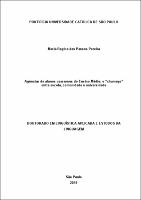Use este identificador para citar ou linkar para este item:
https://repositorio.pucsp.br/jspui/handle/handle/22280| Tipo: | Tese |
| Título: | Agências de alunos cearenses do Ensino Médio: o “chamego” entre escola, comunidade e universidade |
| Título(s) alternativo(s): | Agencies of high school students from Ceará: the "partnership" between school, community and university |
| Autor(es): | Pereira, Maria Regina dos Passos |
| Primeiro Orientador: | Liberali, Fernanda Coelho |
| Resumo: | Esta pesquisa tem por objetivo investigar, criticamente, as agências vividas pelos alunos do Ensino Médio de uma escola pública estadual do município de Beberibe- CE, ao longo da participação no projeto Digit-M-Ed Ceará. Especificamente, visa compreender: 1. Como a organização e a participação dos adolescentes nos eventos centrais promoveram a vivência de diferentes agências? e 2. Quais marcas linguísticas evidenciaram as agências vividas durante a pesquisa? Este estudo tem como aporte teórico a Teoria da Atividade Sócio-Histórico-Cultural, como estudada por Vygotsky (1991, 1994, 1999, 2001, 2003, 2004), Leontiev (1978) e Engeström (1991, 2001, 2002, 2011, 2013, 2016). Nesse viés, o conceito de agência é embasado em estudos sócio-histórico-culturais, tais como os fomentados por Edwards (2005, 2007, 2009, 2015), Engeström (2006, 2008, 2009), Ninin e Magalhães (2017), Virkkunen (2006) e Liberali (2017). A fim de enfatizar a concepção de agência defendida nesta pesquisa, foram discutidas as diferenças entre autonomia, protagonismo e agência. Metodologicamente, este estudo pauta-se na Pesquisa Crítica de Colaboração (MAGALHÃES, 2010, 2012), que configurou a organização das ações do Projeto Digit-M-Ed Ceará em uma proposta de fazer pesquisa “com” pessoas em vez de “sobre” pessoas. Essa metodologia garantiu aos participantes papel ativo de construtores de conhecimento, possibilitando, por meio da criação de instrumentos, que compreendessem as próprias ações e as dos outros, conforme contextos de atuação. A produção dos dados aconteceu por gravações em áudio, vídeo e por questionários respondidos pelos participantes. A análise dos dados priorizou as categorias enunciativas, discursivas e linguísticas da Argumentação (LIBERALI, 2013). Os resultados mostraram transformações no agir dos alunos participantes do Digit-M-Ed Ceará, reveladas nas agências relacional, transformativa, crítico-colaborativa e desencapsuladora. A vivência de tais agências marca o quanto os envolvidos tornaram-se sujeitos agentivos em ações tanto no âmbito individual quanto no coletivo |
| Abstract: | This research aimed at investigating, critically, the agencies experienced by the high school students of a public school in Beberibe-CE, during their participation in the Digit-M-Ed Ceará project. Specifically, it focused on understanding how the organization and participation of adolescents in the central events promoted the experiencing of different agencies, and what linguistic marks revealed the agencies experienced during the research. The theoretical framework on which this study is based is the Socio-Historical-Cultural Activity Theory, according to Vygotsky (1991, 1994, 1999, 2001, 2003, 2004), Leontiev (1978) and Engeström (1991, 2001, 2002, 2011, 2013, 2016). Thus, the concept of agency is based on socio-historical-cultural studies, such as those promoted by Edwards (2005, 2007, 2009, 2015), Engeström (2006, 2008, 2009), Ninin and Magalhães (2017), Virkkunen (2006) and Liberali (2017). In order to emphasize the concept of agency defended in this research, the differences between autonomy, protagonism and agency were discussed. Methodologically, this study is anchored in the Collaborative Critical Research (MAGALHÃES, 2010, 2012), which organized the actions of the Digit-M-Ed Ceará Project in a proposal to do research "with" people instead of "about" people. This methodology enabled the participants to have an active role of knowledge builders, allowing them, through the creation of instruments, to understand their own actions and those of others, according to contexts of action. Data were produced by audio, video and questionnaire replies. Data analysis prioritized the categories of Argumentation: enunciative, discursive and linguistic (LIBERALI, 2013). The results showed transformations in the actions of the students participating in Digit-M-Ed Ceará, revealed in the relational, transformative, critical-collaborative and desencapsulating agencies. The experiencing of these agencies reveal the extent to which those involved have become agentive subjects in actions, in both, individual and collective contexts |
| Palavras-chave: | Estudantes do ensino médio Projeto Digit-M-Ed Tipos de agência Comunidade e universidade High school students Types of agency Community and college |
| CNPq: | CNPQ::LINGUISTICA, LETRAS E ARTES::LINGUISTICA::LINGUISTICA APLICADA |
| Idioma: | por |
| País: | Brasil |
| Editor: | Pontifícia Universidade Católica de São Paulo |
| Sigla da Instituição: | PUC-SP |
| metadata.dc.publisher.department: | Faculdade de Filosofia, Comunicação, Letras e Artes |
| metadata.dc.publisher.program: | Programa de Estudos Pós-Graduados em Linguística Aplicada e Estudos da Linguagem |
| Citação: | Pereira, Maria Regina dos Passos. Agências de alunos cearenses do Ensino Médio: o “chamego” entre escola, comunidade e universidade. 2019. 172 f. Tese (Doutorado em Linguística Aplicada e Estudos da Linguagem) - Programa de Estudos Pós-Graduados em Linguística Aplicada e Estudos da Linguagem, Pontifícia Universidade Católica de São Paulo, São Paulo, 2019. |
| Tipo de Acesso: | Acesso Aberto |
| URI: | https://tede2.pucsp.br/handle/handle/22280 |
| Data do documento: | 11-Mar-2019 |
| Aparece nas coleções: | Programa de Pós-Graduação em Linguística Aplicada e Estudos da Linguagem |
Arquivos associados a este item:
| Arquivo | Descrição | Tamanho | Formato | |
|---|---|---|---|---|
| Maria Regina dos Passos Pereira.pdf | 24,38 MB | Adobe PDF |  Visualizar/Abrir |
Os itens no repositório estão protegidos por copyright, com todos os direitos reservados, salvo quando é indicado o contrário.
